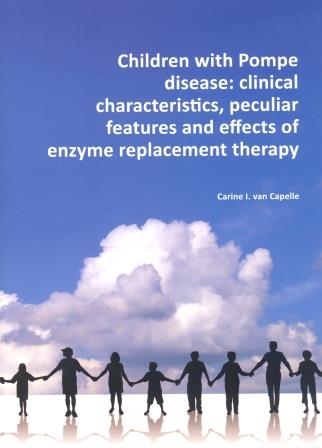 |
Wednesday June 18, 2014 Dr. Carine van Capelle received her PhD on ‘Children with Pompe disease: clinical characteristics, peculiar features and effects of enzyme replacement therapy‘.
Pompe disease presents as a continuous spectrum of clinical phenotypes in which progressive muscle weakness is the main manifestation. Patients with the classic-infantile form of this disease have virtually no residual enzyme activity and are at the severe end of the spectrum, while patients with a certain level of residual enzyme activity present milder phenotypes at the other end of the spectrum.
The first results of enzyme replacement therapy (ERT) with recombinant human alfa glucosidase were promissing since most patients with the classic-infantile form of Pompe disease survived far beyond the first year of life. But, there is still little known about the long-term treatment effects in this group of patients. Much less is known about the natural course of disease in children with less progressive phenotypes and how they respond to ERT. This thesis describes the clinical spectrum of children with Pompe disease, compares them with adult patients, and evaluates the effects of ERT in these childhood Pompe patients. Furthermore it describes the long-term outcome of ERT in patients with classic-infantile Pompe disease, for a maximum period of 14 years, and compares the functioning of these treated infants with that of children with less progressive forms of Pompe disease.
